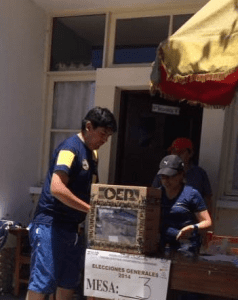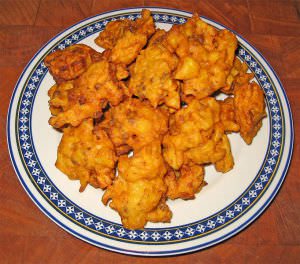Bolivian Election
October 12 was the national presidential election in Bolivia. What is interesting about this date? It was a Sunday. In true Bolivian tradition, there was a party feeling in the streets, as people walked dogs or biked with their families, as all transportation was suspended.
When I went with my host family to watch them vote, I noticed that the corners were full of vendors selling scrumptious food, buffets complete with carved meat, vegetables, fruits, and desserts full of fried yumminess.
Voting is obligatory in Bolivia, and I could not help but marvel at the fact that all work is suspended on election day. People vote in a school closest to their homes, making the trek on foot more feasible for those who are within walking distance.
Even though I can’t say that there was necessarily an air of excitement about the elections themselves (as every Bolivian I asked was sure of the outcome before the polls opened), I was able to listen to neighbors joking with each other about who they were voting for, and be overwhelmed by the number of people who showed at the polls.

Host family voting site. Photo by Padre Simon Baez
Upon arrival, voters searched for their names in what seemed an endless paper trail of names and voting locations. As it is customary to use the last name of your father and mother, my host mother and father ended up at two different voting stations.
While I waited with their new host student, a Korean priest who is currently studying at the Maryknoll Language Institute, we saw a husband and wife trying to contain their fluffy Barbet dogs, that were alternately standing at their shoulders and lunging to be released into the mayhem of the voting frenzy.
Fifteen minutes later, my host mother emerged successfully from her voting poll, and in thirty minutes total my host father joined us and we headed home, having experienced the election process during our first year in Bolivia.
Polls were open from 8 a.m. to 4 p.m., and by 8 p.m. that night preliminary results announced the ganador (winner). By the following day, it was no surprise that Evo Morales was re-elected for his third term as president, with more than a 60% overall majority, and he will hold office until 2020.
In closing, I would like to leave you with the prayer intention that we prayed in church on the day of the election, first in Spanish and then in English:
Por las “Elecciones Generrales” que hoy se lleva a efecto en nuestro pais, para que este derecho de bolivianos libres se refleje en el voto expresado con responsabilidad, mirando el bien comun de todos.
For the “General Elections” that go into effect today in our country, that this right of free Bolivians is reflected in the vote expressed with responsibility, looking for the common good of all.


